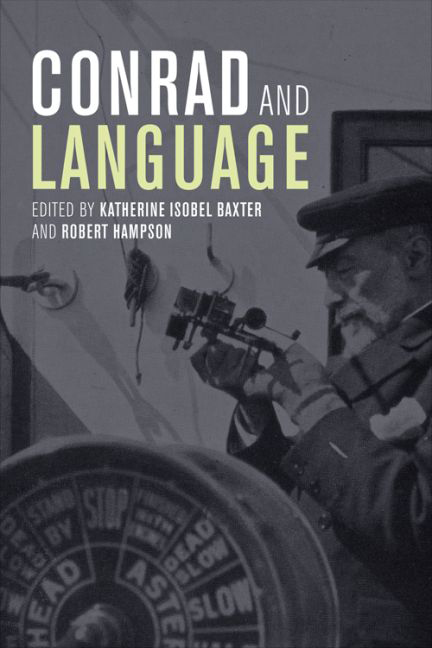Book contents
- Frontmatter
- Contents
- A Note on Texts
- Introduction
- 1 Conrad and Nautical Language: Flying Moors and Crimson Barometers
- 2 Navigating the ‘Terroristic Wilderness’: Conrad's Language of Terror
- 3 Conrad, G. E. Moore and Idealism
- 4 Conrad's Language of Passivity: Unmoving towards Late Modernism
- 5 The Powers of Speech in Conrad's Fiction
- 6 ‘Soundless as Shadows’: Language and Disability in the Political Novels
- 7 Conrad and Romanised Print Form: From Tuan Almayer to ‘Prince Roman’
- 8 Languages in Conrad's Malay Fiction
- 9 Gallicisms: The Secret Agent in Conrad's Prose
- 10 ‘The speech of my secret choice’: Language and Authorial Identity in A Personal Record
- 11 The Russian Redemption of The Secret Agent and Under Western Eyes
- Afterword
- Contributors
- Index
7 - Conrad and Romanised Print Form: From Tuan Almayer to ‘Prince Roman’
Published online by Cambridge University Press: 12 September 2017
- Frontmatter
- Contents
- A Note on Texts
- Introduction
- 1 Conrad and Nautical Language: Flying Moors and Crimson Barometers
- 2 Navigating the ‘Terroristic Wilderness’: Conrad's Language of Terror
- 3 Conrad, G. E. Moore and Idealism
- 4 Conrad's Language of Passivity: Unmoving towards Late Modernism
- 5 The Powers of Speech in Conrad's Fiction
- 6 ‘Soundless as Shadows’: Language and Disability in the Political Novels
- 7 Conrad and Romanised Print Form: From Tuan Almayer to ‘Prince Roman’
- 8 Languages in Conrad's Malay Fiction
- 9 Gallicisms: The Secret Agent in Conrad's Prose
- 10 ‘The speech of my secret choice’: Language and Authorial Identity in A Personal Record
- 11 The Russian Redemption of The Secret Agent and Under Western Eyes
- Afterword
- Contributors
- Index
Summary
‘Kaspar! Makan!’ These are the first words of Conrad's first novel, Almayer's Folly, and this chapter seeks to explore what the Romanised print form of these words reveals about the timing and spacing of Conrad's English. Famously, of course, these opening words are not in English. Almayer's wife is here calling Almayer, by his Christian name Kaspar, to come to dinner – makan – meaning ‘to eat’ in Malay. Conrad's first published words might be considered the first example of what Ian Watt has called ‘delayed decoding’ in Conrad. It takes at least eight pages before the gist of Mrs Almayer's address is translated into English: ‘He had a hazy recollection of having been called some time during the evening by his wife. To his dinner probably.’ This delayed translation of Malay into English sets a pattern for things to come: for the plot of Almayer's Folly; for the long-delayed completion of the Malay trilogy that frames Conrad's entire writing career; and, too, for successive critical attempts to understand and explain the significance of Conrad's decision to write in English. To the extent that the future of Conrad's English turns on this delayed translation-effect, it is worth noting that Mrs Almayer's words will never – perhaps can never – fully be translated into English. Like the later, more famous problem of translation between Malay and English that gives the title to Lord Jim, which I will discuss later, the opening words of Almayer's Folly set up a dialogic exchange between Malay and English that is at least as lopsided, uneven and difficult as the relationship between Mrs Almayer and her husband. Conrad's English is, from the start, translinguistic, but not all languages are equal. The timing and spacing of Conrad's English turn on a hierarchy of hegemonic relations between languages. One of the key things controlling this hierarchy is romanisation: the transcription, transliteration and translation of linguistic exchange into the Romanised print form of English.
- Type
- Chapter
- Information
- Conrad and Language , pp. 117 - 131Publisher: Edinburgh University PressPrint publication year: 2016

